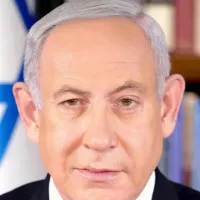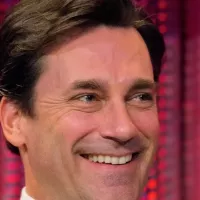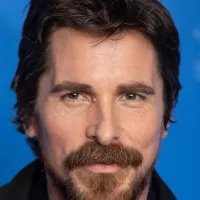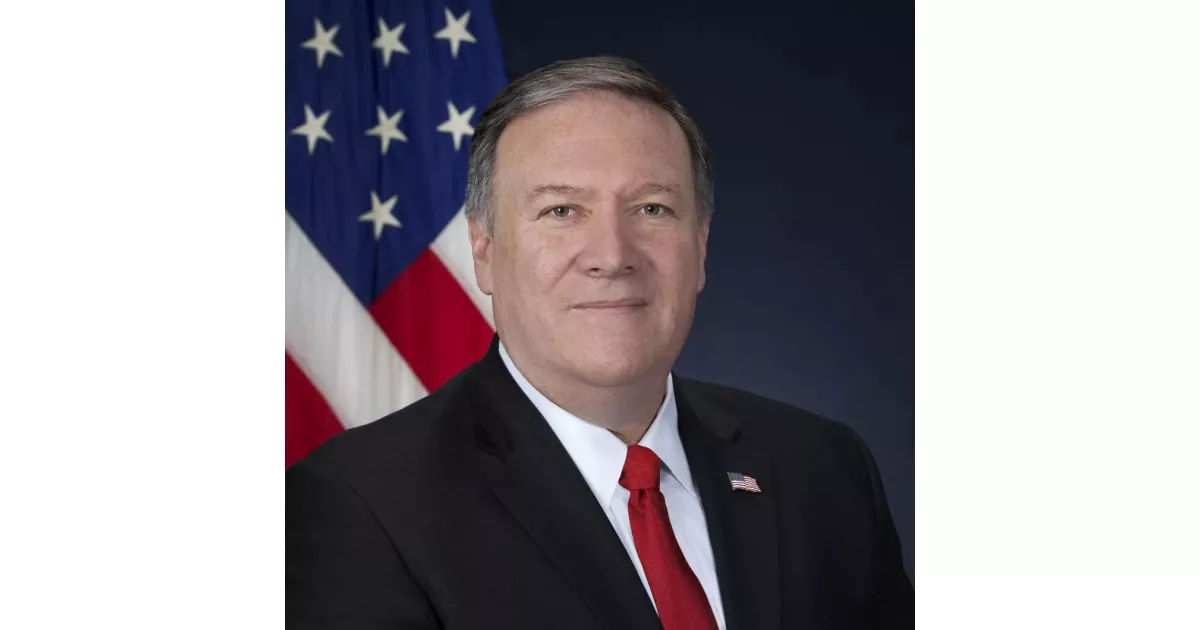Michael Richard Pompeo is an American politician, attorney, diplomat, and former U.S. Army officer. He served as the Director of the CIA from 2017 to 2018 and as the 70th U.S. Secretary of State from 2018 to 2021 under President Donald Trump. Prior to his roles in the Trump administration, Pompeo was a member of the United States House of Representatives from 2011 to 2017.
1900: Pompeo's great-grandmother emigrated to the United States
In 1900, Adelina Tollis, Mike Pompeo's paternal great-grandmother, emigrated from Italy to the United States.
December 30, 1963: Mike Pompeo Born
On December 30, 1963, Michael Richard Pompeo was born. He is an American politician, attorney, diplomat, and former U.S. Army officer.
1982: Graduated from Los Amigos High School
In 1982, Mike Pompeo graduated from Los Amigos High School in Fountain Valley, California.
1986: Served in the U.S. Army
From 1986, Mike Pompeo served in the U.S. Army as an armor officer with the West Germany-based 2nd Squadron, 7th Cavalry in the 4th Infantry Division.
1986: Graduated from West Point
In 1986, Mike Pompeo graduated first in his class from the United States Military Academy at West Point.
1986: Graduation from United States Military Academy
In 1986, Mike Pompeo graduated from the United States Military Academy.
1986: Marriage to Leslie Libert
In 1986, Pompeo married Leslie Libert; they later divorced.
1991: Pompeo left the U.S. Army
In 1991, Mike Pompeo left the U.S. Army at the rank of captain.
1994: Earned Juris Doctor from Harvard Law School
In 1994, Mike Pompeo earned a juris doctor from Harvard Law School.
1996: Moved to Wichita, Kansas, acquired aircraft-parts manufacturers and renamed the entity Thayer Aerospace
In 1996, Mike Pompeo moved to Wichita, Kansas, acquired aircraft-parts manufacturers there (Aero Machine, Precision Profiling, B&B Machine) and in St. Louis (Advance Tool & Die), renaming the entity Thayer Aerospace after West Point superintendent Sylvanus Thayer.
1998: Became an Entrepreneur
In 1998, Mike Pompeo transitioned from working as an attorney to becoming an entrepreneur in the aerospace and oilfield industries.
2000: Marriage to Susan Justice Mostrous
In 2000, Pompeo married Susan Justice Mostrous and formally adopted her son, Nicholas.
2006: Sold interest in Nex-Tech Aerospace and became president of Sentry International
In 2006, Mike Pompeo sold his interest in Nex-Tech Aerospace and then became president of Sentry International.
2007: Local Church Deacon
From 2007 to 2009, Pompeo served as a local church deacon.
2009: Pompeo Signed the No Climate Tax Pledge
In 2009 Mike Pompeo signed the No Climate Tax pledge of Americans for Prosperity.
2009: End of term as Local Church Deacon
Pompeo's time as a local church deacon ended in 2009, after serving since 2007.
2010: Elected to the House of Representatives
In 2010, Mike Pompeo was elected to the United States House of Representatives, representing Kansas's 4th congressional district.
2010: Won Republican primary for Kansas's 4th District congressional seat
In 2010, Mike Pompeo won the Republican primary for Kansas's 4th District congressional seat with 39% of the vote and was later endorsed by Bob Dole.
May 31, 2011: Pompeo Votes to Eliminate Funding for the United Nations Population Fund
On May 31, 2011, Mike Pompeo voted for H.R.2059 11-HR2059, which eliminated funding for the United Nations Population Fund.
2011: Represented Kansas's 4th congressional district
From 2011, Mike Pompeo represented Kansas's 4th congressional district.
2011: Elected to the U.S. House of Representatives
In 2011, Mike Pompeo began his service in the United States House of Representatives.
2012: Pompeo Calls for Elimination of Wind Power Tax Credits
In 2012 Mike Pompeo called for the permanent elimination of wind power production tax credits, calling them an "enormous government handout".
2012: Defeated Democratic nominee Robert Tillman
In 2012, Mike Pompeo defeated Democratic nominee Robert Tillman by a margin of 62–32%.
2013: Pompeo's Comments on Guantanamo Bay and Interrogation
In 2013, Mike Pompeo opposed closing the Guantanamo Bay detention camp. After a visit to the prison, he said, of the prisoners who were on hunger strike, "It looked to me like a lot of them had put on weight." He criticized the Obama administration's decision to end secret prisons and its requirement that all interrogators adhere to anti-torture laws.
2013: Pompeo Supports Government Shutdown, Blames Obama
In 2013, Mike Pompeo supported the United States federal government shutdown of 2013, blaming President Obama. He said he believed the shutdown was necessary to avoid an "American financial collapse 10 years from now".
2013: Pompeo Supports NSA Surveillance Programs
In 2013, Mike Pompeo supported the surveillance programs of the National Security Agency, referring to the agency's efforts as "good and important work".
2013: Pompeo's Comments on Muslim Leaders
In a 2013 speech on the House floor, Mike Pompeo said Muslim leaders who fail to denounce acts of terrorism done in the name of Islam are "potentially complicit" in the attacks. The Council on American–Islamic Relations called on him to revise his remarks, calling them "false and irresponsible".
2013: Pompeo's Statements on Climate Change
Speaking about climate change in 2013, Mike Pompeo said there are scientists who think different things about climate change, including some who believe the climate has been stable for the last 16 years.
March 2014: Pompeo Denounces Snowden Telecast
In March 2014, Mike Pompeo denounced the inclusion of a telecast by Edward Snowden at the South by Southwest conference in Austin, Texas, and asked that it be cancelled, predicting it would encourage "lawless behavior" among attendees.
2014: Won the general election
In 2014, Mike Pompeo won the general election with 67% of the vote, defeating Democrat Perry Schuckman.
2014: Jesus Christ as the only solution
In 2014, Pompeo told a church group that Christians needed to "know that Jesus Christ as our savior is truly the only solution for our world".
2014: Russian annexation of Crimea
In 2014, Russia annexed Crimea, leading to sanctions. When questioned about the differing U.S. responses to Israel's annexation of the Golan Heights versus Russia's annexation of Crimea, Pompeo justified the former by citing "the reality on the ground and the security situation necessary for the protection of the Israeli state."
July 21, 2015: Pompeo Alleges Secret Agreements Between Iran and IAEA
On July 21, 2015, Mike Pompeo and Senator Tom Cotton alleged the existence of secret side agreements between Iran and the International Atomic Energy Agency (IAEA) on procedures for inspection and verification of Iran's nuclear activities under the Joint Comprehensive Plan of Action. Obama administration officials acknowledged the existence of agreements between Iran and the IAEA governing the inspection of sensitive military sites but denied that they were "secret side deals".
November 2015: Pompeo Visits Israel, Praises Netanyahu
In November 2015, Mike Pompeo visited Israel and said, "Prime Minister [Benjamin] Netanyahu is a true partner of the American people."
2015: Withdrawal from the 2015 nuclear deal with Iran
In 2015, Mike Pompeo advocated for the withdrawal of the United States from the nuclear deal with Iran.
2015: Pompeo Opposes Regulation of Greenhouse Gas Emissions
In 2015, Mike Pompeo opposed the regulation of greenhouse gas emissions by the United States and supported eliminating the United States federal register of greenhouse gas emissions. As a member of the United States House Committee on Energy and Commerce, he voted against the Clean Power Plan.
2015: Sponsor of the Safe and Accurate Food Labeling Act of 2015
In 2015, Mike Pompeo was the original sponsor of the Safe and Accurate Food Labeling Act.
2015: Politics is a never-ending struggle
In 2015, Pompeo said in a talk at a church that "politics is a never-ending struggle ... until the Rapture."
February 2016: Pompeo Calls for Snowden's Death Sentence
In February 2016, Mike Pompeo said Snowden "should be brought back from Russia and given due process, and I think the proper outcome would be that he would be given a death sentence." He also expressed support for reforming the Federal Records Act.
November 18, 2016: Nominated to be Director of the CIA
On November 18, 2016, President-elect Donald Trump announced that he would nominate Mike Pompeo to be the director of the Central Intelligence Agency.
2016: Met with William E. Binney to discuss doubts of Russian interference
At Trump's request, Mike Pompeo met with former NSA official William E. Binney to discuss his doubts of Russian interference in the 2016 United States elections.
2016: Pompeo Calls for Re-establishment of Metadata Collection
In 2016 Mike Pompeo stated, "Congress should pass a law re-establishing collection of all metadata, and combining it with publicly available financial and lifestyle information into a comprehensive, searchable database. Legal and bureaucratic impediments to surveillance should be removed. That includes Presidential Policy Directive-28, which bestows privacy rights on foreigners and imposes burdensome requirements to justify data collection."
2016: Pompeo Receives "National Security Eagle Award"
In 2016, ACT for America gave Mike Pompeo a "national security eagle award" for his comments on Islam. Pompeo has been a frequent guest on anti-Muslim activist Frank Gaffney's radio show for the Center for Security Policy.
2016: Beat Democrat Daniel B. Giroux in the general election
In 2016, Mike Pompeo beat Democrat Daniel B. Giroux in the general election with 61% of the vote.
2016: Endorsed Donald Trump
In 2016, Mike Pompeo endorsed Donald Trump after Trump became the Republican nominee in the presidential election, despite previously criticizing him.
2016: Giuliani mentions the 2016 election
In 2016, Rudy Giuliani specifically mentioned the 2016 election (including the DNC server) and Burisma as two topics of importance to the President regarding Ukraine.
2016: Democratic senators running for reelection in 2018 in states that Trump won in 2016, voting to confirm Pompeo
In 2016, five of ten Democratic senators running for reelection in 2018 in states that Trump won in 2016, voting to confirm Pompeo.
2016: Ukraine Interference
On November 26, 2019, Pompeo commented on the possibility that Ukraine interfered with the 2016 election.
January 2017: Appointed Director of the CIA
In January 2017, Donald Trump appointed Mike Pompeo as Director of the Central Intelligence Agency (CIA).
January 2017: Appointment to director of the Central Intelligence Agency (CIA)
In January 2017, Mike Pompeo was appointed director of the Central Intelligence Agency (CIA).
January 2017: Reaffirmation of Saudi Arabia–United States relations since Trump took office
In January 2017, Pompeo honored the then-crown prince of Saudi Arabia Muhammad bin Nayef with the CIA's "George Tenet" Medal. It was the first reaffirmation of Saudi Arabia–United States relations since Trump took office.
January 23, 2017: Confirmed as CIA Director
On January 23, 2017, Mike Pompeo was confirmed by the Senate as the director of the Central Intelligence Agency (CIA) and sworn in later that day.
February 2017: Traveled to Turkey and Saudi Arabia
In February 2017, Mike Pompeo traveled to Turkey and Saudi Arabia to discuss policy on Syria and ISIL and reaffirm Saudi Arabia–United States relations.
March 2017: Invoked state secrets privilege
In March 2017, Mike Pompeo formally invoked state secrets privilege to prevent CIA officers from being compelled to testify in the trial of Bruce Jessen and James Elmer Mitchell.
March 2017: WikiLeaks Publishes Vault 7 Documents
In March 2017, WikiLeaks began publishing a series of documents known as Vault 7, detailing the CIA's electronic surveillance and cyber warfare activities and capabilities.
April 2017: Pompeo Calls WikiLeaks a 'Non-State Hostile Intelligence Service'
In an April 2017 speech addressing the Center for Strategic and International Studies, Pompeo called WikiLeaks "a non-state hostile intelligence service" and described Assange as a "narcissist" and "a fraud—a coward hiding behind a screen".
April 2017: Described WikiLeaks as a "hostile intelligence service"
On April 13, 2017, Mike Pompeo described WikiLeaks as a "hostile intelligence service" in response to the publication of Vault 7.
June 2017: Named Michael D'Andrea head of the CIA's Iran mission center
In June 2017, Mike Pompeo named Michael D'Andrea head of the CIA's Iran mission center.
July 2017: Pompeo on Denuclearizing North Korea
In July 2017, Mike Pompeo spoke about denuclearizing the Korean peninsula, and the dangers of the leader in control of the weapons.
August 2017: Took direct command of the Counterintelligence Mission Center
In August 2017, Mike Pompeo took direct command of the Counterintelligence Mission Center.
September 2017: Sought authority for CIA to make covert drone strikes
In September 2017, Mike Pompeo sought authority for the CIA to make covert drone strikes without the Pentagon's involvement, including inside Afghanistan.
2017: Director of the CIA
In 2017, Mike Pompeo began his service as the director of the Central Intelligence Agency (CIA) in the first administration of Donald Trump.
2017: Pompeo Supports Moving US Embassy to Jerusalem
In 2017, Mike Pompeo supported Trump's decision to move America's embassy in Israel to Jerusalem.
2017: Pompeo Seeks to Undermine Iran Nuclear Deal
In 2017, Mike Pompeo worked to undermine the Joint Comprehensive Plan of Action nuclear deal with Iran (which had been negotiated by the Obama administration) saying, "I look forward to rolling back this disastrous deal with the world's largest state sponsor of terrorism." He also suggested using military action against Iran's nuclear capacity.
2017: End of Term in the House of Representatives
In 2017, Mike Pompeo's service in the United States House of Representatives concluded.
2017: Appointed Former Business Partner as CIA COO
In 2017, upon becoming head of the CIA, Mike Pompeo appointed his former business partner, Brian Bulatao, as the agency's chief operating officer.
March 13, 2018: Nominated to serve as Secretary of State
On March 13, 2018, President Trump announced that he would nominate Mike Pompeo to serve as Secretary of State.
March 31, 2018: Rex Tillerson stepped down
On March 31, 2018, Rex Tillerson stepped down from his position as Secretary of State.
April 2018: Appointed Secretary of State
In April 2018, Donald Trump appointed Mike Pompeo as Secretary of State.
April 26, 2018: Sworn in as Secretary of State
On April 26, 2018, Mike Pompeo was sworn in as Secretary of State.
July 2018: Raised the issue of Xinjiang internment camps and human rights abuses
In July 2018, Mike Pompeo raised the issue of Xinjiang internment camps and human rights abuses against the Uyghur minority in China.
August 2018: Pompeo Calls for Release of Oleg Sentsov
In August 2018, Mike Pompeo called on Russia to "immediately release" jailed Ukrainian filmmaker Oleg Sentsov.
August 2018: Thanked Saudi Arabia for its support for northeast Syria
In August 2018, Mike Pompeo thanked Crown Prince Mohammad bin Salman "for Saudi Arabia's support for northeast Syria's urgent stabilization needs" and discussed the situation in war-torn Yemen.
September 2018: Pompeo Backs US Military Support for Saudi War in Yemen
In September 2018, Mike Pompeo "backed continued U.S. military support for Saudi Arabia's war in Yemen over the objections of staff members after being warned that a cutoff could jeopardize $2 billion in weapons sales to America's Gulf allies, according to a classified memo and people familiar with the decision".
October 2, 2018: Assassination of Jamal Khashoggi
On October 2, 2018, Jamal Khashoggi, a Washington Post columnist, was assassinated. This event became central to controversies involving Saudi Arabia and US foreign policy, particularly concerning the alleged involvement of Crown Prince Mohammad bin Salman.
October 10, 2018: Stated Israel is everything we want the entire Middle East to look like going forward
On October 10, 2018, Mike Pompeo said Israel "is everything we want the entire Middle East to look like going forward" and that the Israel–United States relations are "stronger than ever".
November 2018: Pompeo Blames Iran for Yemen Humanitarian Crisis
In November 2018, Mike Pompeo blamed Iran for the humanitarian crisis in Yemen, saying, "Iran causes death and destruction inside of Yemen and does nothing to prevent the starvation," while Saudi Arabia has "provided millions and millions of dollars of humanitarian relief" for Yemen.
November 16, 2018: CIA assessment leak and Pompeo's response
On November 16, 2018, a CIA assessment was leaked to the media, concluding with "high confidence" that Saudi Arabia's crown prince Mohammad bin Salman ordered the assassination of Jamal Khashoggi on October 2, 2018. Pompeo disputed the CIA's conclusion, stating there was no direct evidence linking the Crown Prince to the assassination, despite mounting pressure from lawmakers for action against Saudi Arabia.
2018: Visited North Korea and met with Kim Jong-un
During Easter weekend in 2018, Mike Pompeo visited North Korea and met with Supreme Leader Kim Jong-un to discuss the upcoming 2018 North Korea–United States summit between Kim and Trump.
2018: Secretary of State
In 2018, Mike Pompeo became the 70th United States Secretary of State, serving in the first administration of Donald Trump.
2018: Senate Foreign Relations Committee voted in favor of sending Pompeo's nomination to the full Senate
In 2018, the Senate Foreign Relations Committee voted 11–9 in favor of sending Pompeo's nomination to the full Senate.
January 7, 2019: Pompeo's diplomatic tour of the Middle East
On January 7, 2019, Pompeo started a diplomatic tour of the Middle East, going to Jordan, Iraq, Egypt, and the Gulf nations. He aimed to reassure regional partners that the U.S. commitment to degrading the Islamic State and countering Iranian influence remained firm, despite the withdrawal of U.S. troops from Syria.
January 23, 2019: U.S. recognition of Juan Guaidó and cancellation of ceremony
On January 23, 2019, Pompeo announced that the U.S. would recognize Juan Guaidó as the interim president of Venezuela. Additionally, a ceremony hosted by the Brazilian-American Chamber of Commerce, originally intended to honor Pompeo and Jair Bolsonaro, was canceled after protests over Bolsonaro's remarks.
March 2019: Spoke to "the work that our administration's done to make sure that this democracy in the Middle East, that this Jewish state, remains... I am confident that the Lord is at work here."
In March 2019, Mike Pompeo spoke to "the work that our administration's done to make sure that this democracy in the Middle East, that this Jewish state, remains ... I am confident that the Lord is at work here." following a visit to the Western Wall with Israeli prime minister Benjamin Netanyahu.
March 2019: Pompeo and Giuliani Exchange Communications
In late March 2019, Pompeo and Giuliani exchanged emails and phone calls before Ambassador Marie Yovanovitch was recalled from Ukraine. Giuliani later admitted to speaking with Pompeo to relay information gathered during his Ukrainian research, providing him with memos of interviews with Ukrainian prosecutors at Pompeo's request.
April 2019: Speech at Texas A&M University
In an April 2019 speech at Texas A&M University, Mike Pompeo said "I was the CIA director. We lied, we cheated, we stole. It was like we had entire training courses . . . it reminds you of the glory of the American experiment."
May 14, 2019: Pompeo meets with Lavrov and Putin in Sochi
On May 14, 2019, Pompeo engaged in meetings in Sochi, Russia, including a three-hour discussion with Russian foreign minister Sergey Lavrov and a ninety-minute meeting with Russian president Vladimir Putin. Discussions covered Syria, North Korea, Iran, Venezuela, and the New Strategic Arms Reduction Treaty (New START). Pompeo also addressed Russian election interference, which Putin denied.
May 2019: Pompeo Refuses to Sign Arctic Council Statement on Climate Change
In May 2019, Mike Pompeo acted against environmental protection at the Arctic Council. He refused to sign on to a joint statement addressing the need for protection of the Arctic region from the threat of rapidly melting ice unless all mentions of climate change were removed from the document.
May 2019: Pompeo Pushes Through Arms Sales to Saudi Arabia and UAE
In May 2019, Pompeo declared an "emergency" to push through $8.1 billion in arms sales to Saudi Arabia and the United Arab Emirates, citing Iranian activity. This decision faced widespread congressional opposition and triggered an investigation by the State Department inspector general.
July 25, 2019: Trump's call with Ukrainian President Zelenskyy
On July 25, 2019, President Trump made a controversial call to Ukraine's president Volodymyr Zelenskyy, soliciting assistance in investigating Joe Biden's son. Initially, Pompeo claimed limited knowledge of the call but was later confirmed to have been on the call himself.
October 1, 2019: Congressional chairmen condemn Pompeo's actions as obstruction of impeachment inquiry
On October 1, 2019, the chairmen of the House Foreign Affairs Committee, the House Intelligence Committee, and the House Oversight Committee stated that any effort to intimidate witnesses or prevent them from talking with Congress, including State Department employees, is illegal and will constitute evidence of obstruction of the impeachment inquiry, in response to Pompeo's actions regarding subpoenas for documents related to Trump's communications with Ukraine.
October 2019: Promotion of Pompeo's speech "On Being a Christian Leader"
In October 2019, the State Department website promoted a speech by Pompeo titled "On Being a Christian Leader," delivered to the American Association of Christian Counselors. Pompeo's discussion of his faith and its application to his government work sparked criticism due to concerns about the separation of church and state.
October 22, 2019: Taylor Testifies on Ukraine Aid
On October 22, 2019, William B. Taylor Jr. testified that the White House was withholding military aid to Ukraine to force cooperation on U.S. domestic political issues, and that Pompeo failed to respond directly to complaints about Rudy Giuliani's shadow foreign policy efforts, leading Taylor to conclude that Ukrainians would die due to the lack of aid.
October 23, 2019: FOIA Request for Ukraine-Related Records
On October 23, 2019, a Freedom of Information Act (FOIA) request by American Oversight led to a federal judge ordering the State Department to release Ukraine-related records, including communications between Pompeo and Rudy Giuliani.
November 2019: U.S. policy shift on Israeli settlements
In November 2019, Pompeo announced that the U.S. no longer considers Israeli settlements in the occupied West Bank a violation of international law. This decision marked a break from decades of U.S. policy.
November 20, 2019: Sondland's Testimony
On November 20, 2019, Gordon Sondland testified that Rick Perry, Kurt Volker, and himself kept in touch with Rudy Giuliani regarding the President's expectation for Ukraine to investigate corruption issues. Sondland stated they kept the NSC and State Department, including Pompeo, informed and that Pompeo was still telling Volker to talk with Giuliani as late as September 24.
November 26, 2019: Pompeo on Ukraine Interference
On November 26, 2019, Pompeo appeared to legitimize a conspiracy theory suggesting Ukraine, not just Russia, interfered in the 2016 United States elections, stating the U.S. has a duty to investigate any country that has interfered with American elections.
2019: Pompeo defends Turkish offensive into north-eastern Syria
In 2019, Pompeo defended the Turkish offensive into north-eastern Syria, acknowledging Turkey's "legitimate security concern" regarding a "terrorist threat to their south." However, he denied that the United States had given Turkey a "green light" to attack the Kurds.
January 2020: Pompeo's interview with NPR and subsequent reprimand
In January 2020, Pompeo abruptly ended an interview with Mary Louise Kelly of NPR's All Things Considered. Following this, he called her to private quarters and admonished her for asking questions about Ukraine during the interview.
January 2020: Assassination of Qasem Soleimani
In January 2020, the Trump administration authorized a drone strike that assassinated Iranian General Qasem Soleimani. Pompeo was reportedly a key advisor in the decision-making process. Following the strike, Pompeo stated that the attack was ordered to disrupt an "imminent attack" by Soleimani operatives.
March 5, 2020: ICC approves investigation into alleged US crimes in Afghanistan
On March 5, 2020, the ICC approved an investigation into alleged US crimes in Afghanistan, offering victims hope for justice. However, the decision included restrictions on the issuance of visas on Mike Pompeo's instructions from the Department of State.
March 17, 2020: Pompeo threatens ICC staff members
On March 17, 2020, Pompeo threatened staff members of the International Criminal Court (ICC), Phakiso Mochochoko and ICC prosecutor Fatou Bensouda, regarding their efforts to investigate Americans. Pompeo claimed they were putting Americans at risk and suggested the US could take action against them and their families.
April 23, 2020: Pompeo Claims China Denied U.S. Scientists Access
On April 23, 2020, Pompeo claimed that China had denied U.S. scientists permission to enter the country to investigate the origins of the COVID-19 pandemic.
May 13, 2020: Pompeo Visits Israel
On May 13, 2020, Pompeo made a visit to Israel, marking his first trip overseas since the start of the coronavirus pandemic.
May 2020: Firing of State Department inspector general Steve Linick
In May 2020, Steve Linick, the State Department inspector general, was fired after beginning an investigation into alleged ethics violations by Pompeo and his wife. The investigation continued after his firing and found numerous instances of misconduct.
May 2020: Trump Fires Inspector General Linick
In May 2020, Trump fired Inspector General Linick at Pompeo's recommendation, leading to scrutiny from Congress.
june 11, 2020: Trump issues Executive Order 13928 against the ICC
On June 11, 2020, President Trump issued Executive Order 13928, Blocking Property of Certain Persons Associated With the International Criminal Court. This action impeded the ICC's investigations in Afghanistan and other locations, while the U.S. also opposed ICC scrutiny of potential Israeli crimes against Palestinians.
June 2020: Linick Testifies About Pressure to Halt Investigation
In June 2020, Linick testified that Brian Bulatao attempted to improperly pressure him into halting the investigation into Pompeo.
June 2020: Pompeo declines to run for Senate in Kansas
In June 2020, Pompeo decided not to leave the Trump administration to run for the U.S. Senate seat in Kansas, which was open after Pat Roberts announced his retirement.
July 23, 2020: Pompeo Announces End of 'Blind Engagement' with China
On July 23, 2020, Mike Pompeo, during his Communist China and the Free World's Future speech, announced the end of what he called "blind engagement" with the Chinese government. He also criticized Chinese Communist Party general secretary Xi Jinping as "a true believer in a bankrupt totalitarian ideology".
August 2020: Afghan Government Releases Taliban Prisoners
By August 2020, the Afghan government released all but 400 of the 5,000 imprisoned Taliban members as required by the deal. Pompeo urged the Afghan government to release the remaining prisoners to start intra-Afghan negotiations.
August 2020: OIG Report on Emergency Arms Sales
In August 2020, the OIG issued a report following the investigation into emergency arms sales, finding that Pompeo did not violate procedures but that the State Department failed to fully consider the humanitarian impact of the sales to Saudi Arabia and the UAE.
August 25, 2020: Pompeo Speaks at Republican National Convention
On August 25, 2020, Pompeo recorded a speech during an official diplomatic visit to Jerusalem for the Republican National Convention, in support of Donald Trump. This broke precedent and led to an ethics probe.
August 27, 2020: Pompeo concludes Middle East trip to encourage Arab-Israeli normalization
On August 27, 2020, Pompeo concluded a Middle East trip after visiting Omani Sultan Haitham bin Tarik Al-Said. The trip aimed to encourage Arab countries to follow the UAE's move to normalize relations with Israel.
September 2020: Pompeo Accuses China of Fomenting Racial Unrest in the U.S.
In September 2020, Mike Pompeo accused the Chinese government of trying to foment racial unrest in the United States during an address to state lawmakers in Wisconsin.
September 2020: Sanctions against the ICC
In September 2020, Pompeo enacted sanctions against the International Criminal Court's chief prosecutor and other officials, continuing a non-cooperative policy towards the court in The Hague.
September 2020: Resumption of "Madison dinners" at the Blair House
In September 2020, Pompeo resumed the "Madison dinners" at the Blair House, despite ongoing controversy and public health concerns related to the COVID-19 pandemic. These taxpayer-funded dinners were attended by elites and raised ethical questions.
October 2020: Pompeo Cancels Visits Due to Trump's COVID-19 Diagnosis
In October 2020, Donald Trump was diagnosed with COVID-19, and Mike Pompeo cancelled scheduled visits to South Korea and Mongolia. However, he still held a meeting with the foreign ministers of Quad allies Australia, India and Japan, during which he accused the Chinese Communist Party of "exploitation, corruption and coercion".
November 10, 2020: Pompeo on Transition to Second Trump Administration
On November 10, 2020, Pompeo stated there would be a smooth transition to a second Trump administration, despite Joe Biden winning the 2020 presidential election.
December 2020: Pompeo Hosts Holiday Parties
In December 2020, Pompeo hosted large indoor holiday parties during a spike in COVID-19 cases, violating public health guidelines and D.C. restrictions. These parties were described as superspreader events, and many invitees rejected invitations.
2020: Supporting Trump's efforts to overturn the 2020 presidential election
In 2020, Mike Pompeo supported Trump's efforts to overturn the presidential election.
2020: Pompeo declines to offer U.S. consular protection to Joshua Wong
In 2020, Pompeo declined to offer U.S. consular protection to Hong Kong democracy activist Joshua Wong, despite appeals from Wong and several members of Congress, citing risks of retaliation from Beijing and broader U.S. interests in the region.
2020: Daniel Russel Argues Pompeo's China Policy Will Bolster Support for Xi Jinping
In 2020, the former assistant secretary of state for East Asian and Pacific affairs, Daniel Russel, argued that Pompeo's policy would have "the opposite effect, in bolstering support in China for Xi Jinping and deepening anger towards the United States".
2020: Killing of Quds Force commander Qasem Soleimani
The assassination plot against Pompeo in 2022 was reportedly part of a broader Iranian campaign to target former senior U.S. officials involved in the 2020 killing of Quds Force commander Qasem Soleimani.
January 12, 2021: Pompeo Cancels European Trip
On January 12, 2021, Pompeo cancelled a planned European trip after European diplomats declined to meet with him.
January 2021: Pompeo Joins Hudson Institute
In January 2021, Pompeo joined the Hudson Institute as a distinguished fellow.
January 19, 2021: State Department Determines Genocide in Xinjiang
On January 19, 2021, Pompeo announced that the State Department had determined that China perpetrated "genocide and crimes against humanity" against Uyghur Muslims and other minorities in Xinjiang.
April 1, 2021: Biden administration repeals sanctions against the ICC
On April 1, 2021, the Biden administration repealed the sanctions that were applied to the ICC's personnel through Executive Order 14022.
April 2021: Release of report on Pompeo's ethics violations
In April 2021, the review report on ethics violations by Pompeo was released, revealing over 100 instances where Pompeo requested State Department staff to perform personal errands for him and his wife. The inspector general found this behavior inconsistent with regulations.
June 2021: Pompeo Found CAVPAC
In June 2021, Pompeo founded the Champion American Values PAC (CAVPAC).
August 2021: Pompeo on Afghanistan Withdrawal
In August 2021, Pompeo expressed support for the Biden administration's extension of the U.S. troop withdrawal timeline from Afghanistan but later distanced himself and the Trump administration from the situation following the fall of Kabul to the Taliban.
November 2021: Report Concludes Pompeo Violated Hatch Act
In November 2021, the Office of the Special Counsel released a report concluding that Pompeo was one of at least 13 senior Trump administration officials who violated the Hatch Act by speaking at the Republican National Convention.
2021: End of Term as Secretary of State
In 2021, Mike Pompeo's term as the United States Secretary of State came to an end.
2021: Regret over lack of progress on North Korea
In a 2021 interview, Mike Pompeo said that he regretted the lack of progress made on North Korea.
January 2022: Weight Loss Claim
In January 2022, Pompeo claimed in an interview with Fox News that he had lost over 90 lb (41 kg) in the prior six months through self-guided exercises and dietary changes. However, experts were skeptical of this claim.
February 2022: Pompeo Praises Putin, Later Calls Him a Dictator
In February 2022, right before Russia invaded Ukraine, Mike Pompeo gave an interview in which he praised Russian president Vladimir Putin. Russian state television aired the interview. Later that month, during a speech at the Conservative Political Action Conference, Pompeo called Putin a "dictator" over the invasion, though also stated that he continued to believe that China was a greater national security threat to the United States than Russia.
June 2022: Pompeo Describes Russian Invasion of Ukraine as 'Planned Genocide'
During a speech at the Hudson Institute in June 2022, Mike Pompeo described the Russian invasion of Ukraine as a "planned genocide" designed to create a "new Russian Empire" similar to the Soviet Union with large amounts of energy reserves.
August 2022: Alleged Iranian Plot to Assassinate Pompeo
In August 2022, it was revealed that Pompeo was the target of an alleged plot by Iran to assassinate him and other officials.
2022: Lawsuit Filed Against Pompeo Over Assange Surveillance
In 2022 a lawsuit was filed against Pompeo and other defendants alleging that they have illegally placed Assange and his guests under surveillance.
2022: Iranian Assassination Plot Against Pompeo in Paris
In 2022, Iranian operatives nearly assassinated Mike Pompeo during his visit to Paris, according to a report in The Washington Post. The operation was part of a broader Iranian campaign to target former senior U.S. officials involved in the 2020 killing of Quds Force commander Qasem Soleimani.
January 2023: Pompeo's Memoir Published
In January 2023, HarperCollins published Pompeo's memoir, "Never Give an Inch: Fighting for the America I Love."
April 2023: Pompeo Decides Not to Run for President
In April 2023, Pompeo announced his decision not to run for the 2024 Republican presidential nomination, after considering a candidacy and touring early primary states.
October 2023: Pompeo Joins Oberheiden, P.C.
In October 2023, Pompeo became Of counsel for Texas-based law firm Oberheiden, P.C., a federal criminal defense law firm, joining former US Congressman Trey Gowdy and former Director of National Intelligence John Ratcliffe.
2023: Pompeo Joins Cyabra's Board of Directors
In 2023, Pompeo joined the board of directors of Cyabra, an Israeli counter-disinformation company.
2023: Pompeo Features in Documentary
In 2023, alongside David M. Friedman, Pompeo featured in the documentary "Route 60: The Biblical Highway", directed by Matt Crouch.
2023: Pompeo Claims Israel Has Biblical Claim to Palestinian Territories
In 2023, during a podcast interview, Mike Pompeo claimed that Israel had a biblical claim to the Palestinian territories, and therefore the situation could not be defined as an occupation. Pompeo also called Palestinian president Mahmoud Abbas a "known terrorist".
January 2024: House Select Committee hearing on CCP and Joshua Wong
During a January 2024 House Select Committee on the Chinese Communist Party hearing titled "Authoritarian Alignment: The CCP's Support for America's Adversaries," Pompeo addressed his decision not to offer U.S. consular protection to Hong Kong democracy activist Joshua Wong in 2020, stating, "I think the United States can always do more whether it's for him, Nathan Law, Jimmy Lai..."
May 2024: Pompeo Attends Inauguration of Taiwan's President Lai
In May 2024, Mike Pompeo returned to Taiwan as part of the American delegation to the inauguration of President William Lai. Pompeo reiterated his support for official U.S. recognition of the country during the visit.
June 2024: Pompeo Launches the Pompeo Foundation
In June 2024, Pompeo launched the Pompeo Foundation by creating an account on X and registering for 501(c)3 status.
2024: Trump said he would "not be inviting Mike Pompeo and Nikki Haley to join" his next administration.
After Trump's victory in the 2024 election, he declared in an Instagram post that he would "not be inviting Mike Pompeo and Nikki Haley to join" his next administration.
2024: Trump Declares Pompeo Unwelcome
Following Donald Trump's victory in the 2024 election, he declared that Mike Pompeo and Nikki Haley would not be invited to join his next administration. According to The Wall Street Journal, Tucker Carlson and Donald Trump Jr. played a key role in blocking Pompeo's return; Carlson argued that Pompeo was a "warmonger".
2024: Pompeo's book release and political ambitions
In 2024, Pompeo's book, Never Give an Inch: Fighting for the America I Love, was seen as a promotion for his presumed candidacy in the 2024 Republican presidential primary. The book reiterates Pompeo's view that the assassination of Jamal Khashoggi was of little international consequence.
2024: Pompeo Considered Republican presidential nomination
Pompeo considered a candidacy for the 2024 Republican presidential nomination and toured early primary states.
January 22, 2025: Pompeo's Security Detail Revoked
On January 22, 2025, President Trump revoked Mike Pompeo's security detail.
February 2025: Pompeo Hired by Columbia University
In February 2025, Mike Pompeo was hired by Columbia University as a distinguished fellow at its Institute of Global Politics to teach a course on diplomacy, decision-making, and organizational leadership. Pompeo believed that Columbia University hired him to provide a different view than most of the faculty.
June 2025: Reported Iranian Assassination Plot
In June 2025, The Washington Post reported, citing intelligence sources, that Iranian operatives came close to assassinating Pompeo during his visit to Paris in 2022. The operation was reportedly part of a broader Iranian campaign to target former senior U.S. officials involved in the 2020 killing of Quds Force commander Qasem Soleimani. The plot ultimately failed, but Iranian agents came alarmingly close to executing the plan.
2025: Pompeo Foundation Website Launched
In 2025 a website, PompeoFoundation.com, was launched.
2059: HR2059 11-HR2059
On May 31, 2011, Mike Pompeo voted for H.R.2059 11-HR2059, which eliminated funding for the United Nations Population Fund.
Mentioned in this timeline

Donald John Trump is an American politician media personality and...

Vladimir Vladimirovich Putin is a Russian politician and former intelligence...
Ukraine is a country in Eastern Europe the second-largest on...

Benjamin Bibi Netanyahu is a prominent Israeli politician and diplomat...

Joe Biden is an American politician who served as the...

The White House located at Pennsylvania Avenue NW in Washington...
Trending

50 minutes ago Jon Hamm Discovers Viral Dancing Meme; Reacts to Meme-Worthy Status at 54.

50 minutes ago Georgia: Missing child found safe after Amber Alert issued in Barrow County.

2 hours ago Selena Gomez Defends Benny Blanco Amid Dirty Feet Frenzy and Divorce Comments.

2 hours ago Blackpink Announces New Album 'DEADLINE' and Teases New Era.

2 hours ago Christian Bale transforms for 'The Bride,' calls character 'old-fashioned,' praises Gyllenhaal's script.
2 hours ago Jaden McDaniels' rise with Timberwolves foreseen by Crawford; joins Leonard's exclusive group.
Popular

Jesse Jackson is an American civil rights activist politician and...

Susan Rice is an American diplomat and public official prominent...

Barack Obama the th U S President - was the...

XXXTentacion born Jahseh Dwayne Ricardo Onfroy was a controversial yet...

Michael Joseph Jackson the King of Pop was a highly...

Kashyap Pramod Patel is an American lawyer who became the...

